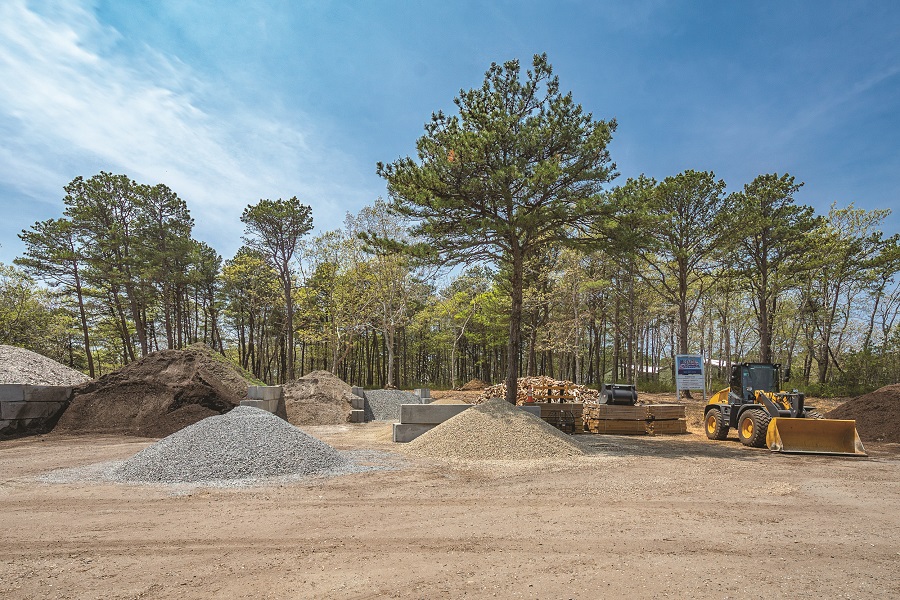TRURO — Robert Martin has been selling firewood from a roadside lot at 100 Route 6 since he began renting it on Jan. 15. This spring, the business’s footprint seemed to grow larger and flatter, as concrete bays of landscaping material went in. Then piles of gravel arrived, along with signs for RJM Enterprises.

Martin didn’t ask for permission to expand the operation in these ways. “I assumed I could,” he said, “since that is what has been done on the property for 60 years.”
On May 3, Martin received a cease-and-desist letter from Truro Building Commissioner Richard Stevens after the town was advised in a letter from Cape Cod National Seashore Supt. Brian Carlstrom that Martin’s activities on the site were unlawful.
Martin said this week he plans to appeal the order to cease operations and that he considers it a case of “selective enforcement.”
The 1.7-acre property, formerly the site of Jack’s Gas, is in the National Seashore. Both federal regulations and the town’s zoning bylaws stipulate that commercial use of a property that was active before 1961, when the Seashore was created, may continue, but “in no case shall the use be altered or converted to another commercial use,” according to the Truro bylaw.
According to Carlstrom, the sale of gasoline is the only commercial use that predated the establishment of the Seashore. Other commercial uses, including the sale of firewood and landscaping materials like loam and wood chips, are not allowed, he said. Carlstrom cited a 2004 Truro Zoning Board of Appeals meeting at which a lawyer representing the Aiken family, the owners of the property, stated that the sale of firewood began at the site in 1981.
“At that hearing, the Seashore explained the ancillary sale of firewood at the station is not a lawfully pre-existing, nonconforming use within the Seashore District under the town zoning bylaw, nor under the park’s enabling legislation,” Carlstrom’s letter says.
At an April 12 planning board meeting to review Martin’s site plan, Seashore Planner Lauren McKean said that, after a gas spill in 1998, the Seashore allowed the Aikens to sell firewood as a “stopgap measure because of the hardship on the Aiken family.”
McKean added that “the hardship is not there anymore. There is no commercial use that can occur on this property.”
But Town Planner Barbara Carboni said in an April 10 memorandum to the planning board that “it is presumed that the sale of firewood continues to be protected as a pre-existing nonconforming use.” At the planning board’s meeting on April 12, Carboni referred to “the additional material on the property and the fact that the site itself was being modified” as the reasons why Martin had been asked to submit a site plan for the board’s review.
Martin told the Independent that “there were a few trees cut down” at the site and that he was “expanding marginally. I did take five or ten feet backwards. I’m not going to deny any of those facts, but I was under the assumption that I could do that.”
Truro’s bylaws prohibit the filling of land, dumping or removal of soil, and cutting of timber in the Seashore for any reason other than controlling brush and clearing rights-of-way.
According to Martin’s lease, the property can “only be used for the processing of firewood, and stockpiling of landscaping materials,” but the tenant “shall be subject to rules and regulations of both the town of Truro and the National Seashore.”
At the April 12 meeting, planning board member Paul Kiernan said that “the firewood sales area is within the layout of Route 6. The topsoil has been stripped off and covered with wood chips. All of that seems to fly in the face of our bylaw.”
The board unanimously voted to continue the hearing to May 24.
Martin said that he has agreed to stop importing landscaping material onto the property, but his sale of the material and of firewood will continue as he appeals the order.
“Until a judge stamps a document that says I can’t be there, I’m going to be there,” he said. “They want to render the land useless, and I’m not going to do that.”
Editor’s note: An earlier version of this article, published in print on May 18, inaccurately referred to the context for a statement by Truro Town Planner Barbara Carboni at the April 12 planning board meeting. She was referring to the reasons for Robert Martin’s being asked to submit a site plan for review, not to the building commissioner’s cease-and-desist letter, which was dated May 3.



